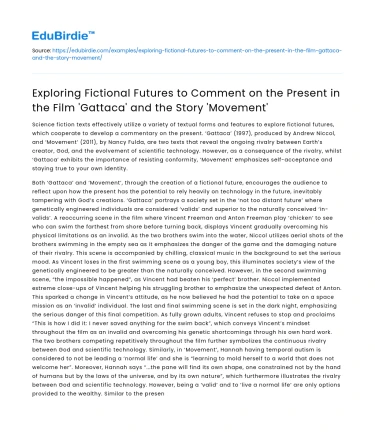Science fiction texts effectively utilize a variety of textual forms and features to explore fictional futures, which cooperate to develop a commentary on the present. ‘Gattaca’ (1997), produced by Andrew Niccol, and ‘Movement’ (2011), by Nancy Fulda, are two texts that reveal the ongoing rivalry between Earth’s creator, God, and the evolvement of scientific technology. However, as a consequence of the rivalry, whilst ‘Gattaca’ exhibits the importance of resisting conformity, ‘Movement’ emphasizes self-acceptance and staying true to your own identity.
Both ‘Gattaca’ and ‘Movement’, through the creation of a fictional future, encourages the audience to reflect upon how the present has the potential to rely heavily on technology in the future, inevitably tampering with God’s creations. ‘Gattaca’ portrays a society set in the ‘not too distant future’ where genetically engineered individuals are considered ‘valids’ and superior to the naturally conceived ‘in-valids’. A reoccurring scene in the film where Vincent Freeman and Anton Freeman play ‘chicken’ to see who can swim the farthest from shore before turning back, displays Vincent gradually overcoming his physical limitations as an invalid. As the two brothers swim into the water, Niccol utilizes aerial shots of the brothers swimming in the empty sea as it emphasizes the danger of the game and the damaging nature of their rivalry. This scene is accompanied by chilling, classical music in the background to set the serious mood. As Vincent loses in the first swimming scene as a young boy, this illuminates society’s view of the genetically engineered to be greater than the naturally conceived. However, in the second swimming scene, “the impossible happened”, as Vincent had beaten his ‘perfect’ brother. Niccol implemented extreme close-ups of Vincent helping his struggling brother to emphasize the unexpected defeat of Anton. This sparked a change in Vincent’s attitude, as he now believed he had the potential to take on a space mission as an ‘invalid’ individual. The last and final swimming scene is set in the dark night, emphasizing the serious danger of this final competition. As fully grown adults, Vincent refuses to stop and proclaims “This is how I did it: I never saved anything for the swim back”, which conveys Vincent’s mindset throughout the film as an invalid and overcoming his genetic shortcomings through his own hard work. The two brothers competing repetitively throughout the film further symbolizes the continuous rivalry between God and scientific technology. Similarly, in ‘Movement’, Hannah having temporal autism is considered to not be leading a ‘normal life’ and she is “learning to mold herself to a world that does not welcome her”. Moreover, Hannah says “...the pane will find its own shape, one constrained not by the hand of humans but by the laws of the universe, and by its own nature”, which furthermore illustrates the rivalry between God and scientific technology. However, being a ‘valid’ and to ‘live a normal life’ are only options provided to the wealthy. Similar to the present, in the futuristic society the societal hierarchy will be money-orientated where only the wealthy will be able to afford genetic engineering and synaptic grafting. Evidently, both texts reveal the detrimental impact on society from tampering with nature and the potential of a futuristic money-orientated society.
Save your time!
We can take care of your essay
- Proper editing and formatting
- Free revision, title page, and bibliography
- Flexible prices and money-back guarantee
Through the creation of a fictional future, ‘Gattaca’ and ‘Movement’ portray how social control can hinder our freedom. The film begins with the biblical allusion: “Consider God’s handiwork; who can straighten what He hath made crooked?” (Ecclesiastes, 7:13). ‘Gattaca’ and ‘Movement’ answer this question differently, despite that Vincent and Hannah similarly struggle to realise their identities, accept their weaknesses and finally overcome their physical limitations to fulfil their aspirations. Vincent in ‘Gattaca’ goes to the extremes to overcome the inevitable of his limitations and accepts any possible help in order to fulfil his dream. He relies solely on Jerome Eugene Marrow to provide him his perfect genetic status to become one perfect person, showing a similar relationship resemblance to artists Vincent van Gogh and Paul Gauguin. Niccol repetitively utilizes close-ups of blood and skin motifs which illustrate how much the society honor genetics. However, in ‘Movement’, a flytrap is described as “crushed against the sidewalk, overshadowed by the smaller, sturdier plants that crowd above it”, which exposes how in the present, society values genetic-engineering over natural conceiving. However, the repetition in, “I do not want to live small. I do not want to be like everyone else… I do not want new shoes”, portrays how Hannah alone is overcoming her genetic shortcomings by rejecting any help and honoring and staying true to herself.
Ultimately, ‘Gattaca’ and ‘Movement’ are both science fiction texts that explore similar fictional futures and examine the futuristic rivalry between the Earth’s creator, God, and the evolvement of scientific technology. The special techniques of filming ‘Gattaca’ have highlighted the growth of Vincent throughout the film to overcome his genetic weaknesses and has revealed potential detrimental impacts from tampering God’s original creations. However, ‘Movement’ comments differently about the present, illustrating Hannah’s growth to show that humans are resisting and becoming more aware of these effects, aiding to prevent them in the futuristic society.






 Stuck on your essay?
Stuck on your essay?

